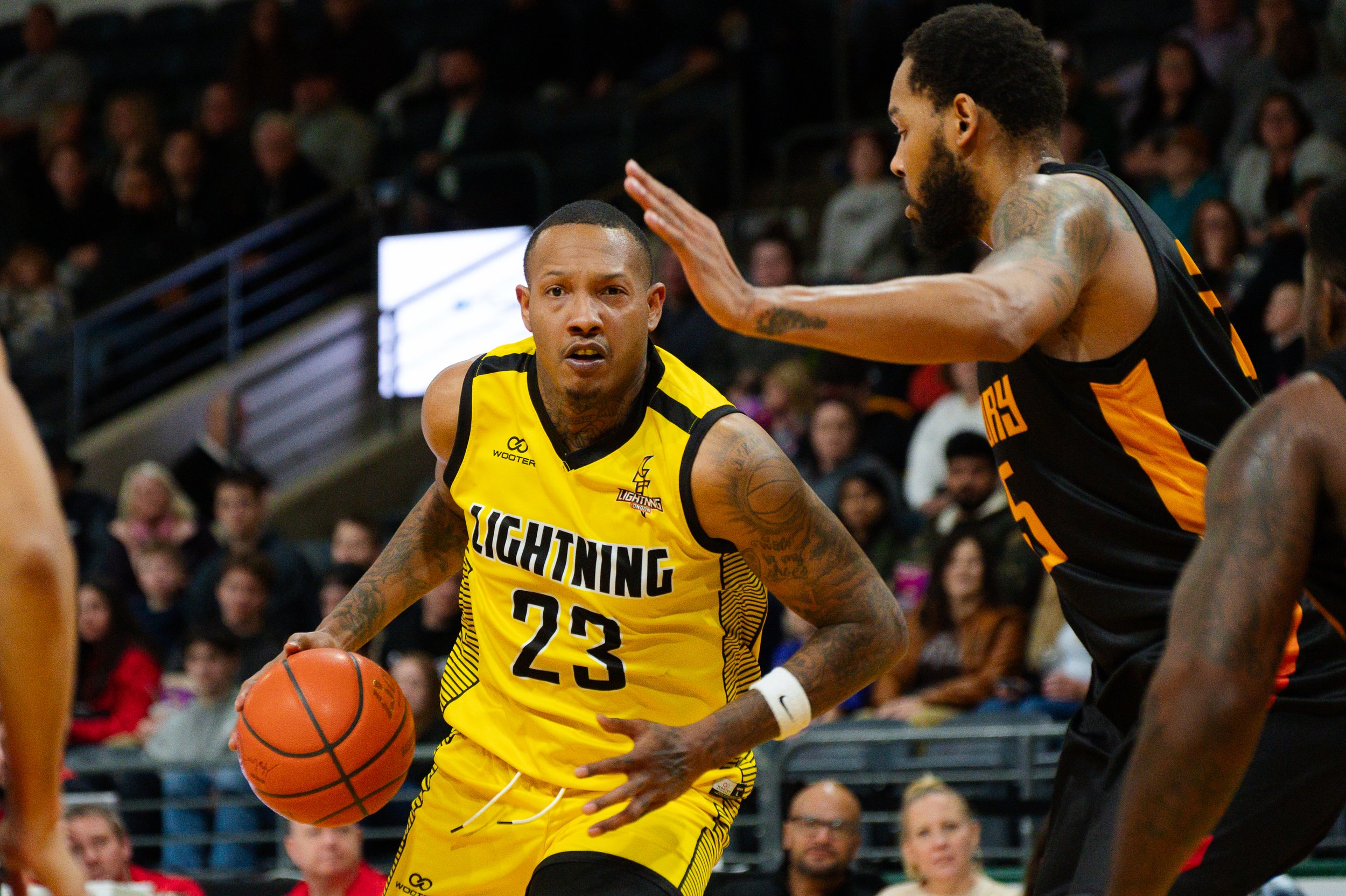Shadell a survivor — on and off the court
His on-court energy — and jubilance — is infectious. It’s real, but it’s only part of Shadell Millinghaus. He’s also a survivor, with mental scars from past trauma and depression. Faith, family and basketball have gotten him through.
(Photo: Matt Hiscox Photography).
* * *
It’s hard not to notice him. The slick moves. That mischievous smile. His absolute joy for the game.
It requires squinting past the flash of the London Lightning guard to uncover some deeper realities. Only then can you start to see a man who has wrestled with a lifetime of challenges – weights that he still carries but refuses to let obscure his love of family and his passion for his game.
“You gotta be built mentally tough for this life. Everybody goes through stuff – some go through far worse things than others. But you gotta keep pushing forward. That’s the main thing. I’m always trying to look at the bright side of things,” Shadell Millinghaus explained.
“Even to this day, I still deal with things. That’s why I try to bring joy to others. Life can be hard. If you look at the world today, a lot of things can set people back. I don’t know what anybody else is dealing with, so that’s why I try to put a smile on people’s faces by the way I play. Sometimes it’s the smallest things that can make a difference.”
* * *
Dad put a ball in his hands early. With two older brothers already in the game, Millinghaus gravitated towards the court and ended up falling in love between the baselines. But basketball was far more than a game – it was a respite from a less-than-perfect life.
“I don’t even know how I got to this part of my life. When I was younger, I was dealing with homelessness, living in shelters. I was out there at 8-years-old selling laundry detergent by the train station in the Bronx. I was selling DVDs on the street. I was out there just to survive.
“It seems like I have been in survival mode my whole life. But basketball was an outlet for me to let all that anger and frustration out on the court because there were other ways I was letting it out, but they weren’t good.”
There were many stops for high school – Schenectady (N.Y.) High School, Troy (N.Y.), Believe Prep (Rock Hill, S.C.), and still more for college, including Southern Mississippi, Northwest Florida State College, and Texas Tech. None of those stops were exactly storybook, if we’re being honest, with each having successes, failures, pains, and regrets attached to them.
The greatest collegiate achievement for Millinghaus came at Northwest Florida, where he was named Panhandle Conference Player of the Year in 2015. At the end of that season, he journeyed to Texas Tech for his recruiting trip, then hurried home to Florida for the baby shower of his first daughter.
(Photo: Barry Field Photography).
“I’ve been a dad for a minute,” said the now father of three. “Having a kid at a young age, that’s a lot of pressure. (Becoming a parent) forces you to grow up so fast. I don’t regret it – I love my kids. My family is a big thing for me. But it was a lot at that moment.”
Once on campus in Lubbock, his concentration suffered by being away from a new family. The playing time never came, and the game no longer provided the escape that he needed. In June 2017, the Red Raiders released Millinghaus, who averaged only 3.9 points and 2.1 rebounds per game.
“I had finally made it. I was in Division I. I had a chance to go to The League. And none of that is the first thing on my mind,” he said. “I wish I could go back. When I was at Texas Tech, I wasn’t the player there who I was meant to be.”
He coped with the pressures completely wrong. Instead of more time in the gym, he spent more time partying. The pressure of a student-athlete, combined with the pressures of parenthood, were a lot. Heap on top of those a lifetime of unprocessed trauma, and you have a young man spiraling.
“I didn’t understand what I didn’t understand. I didn’t know how to deal with what was happening to me. I look back and I was cruel to people because I was desensitized to it. But as time went on, as I got older, I started to realize I was dealing with stuff. I was in denial.”
What he can see clearly today, thanks to the help of family and friends, is that he was struggling with so much more than the pressures of parenthood.
“I got to the point where I realized it was depression. There was something wrong. That was the biggest step – admitting to yourself that you are really going through things.”
He continued, “As a man, especially as a black man, you’re supposed to be extra tough. So, I would pretend nothing was wrong with me, brush it off, and then I would get in my car, start driving, and the tears came down my eyes. I was in my feelings. I couldn’t explain it. I couldn’t pinpoint what was wrong with me. I didn’t know what depression was. I was all over the place. How do I act? What do I even do? Who do I talk to? People would ask me, ‘Are you OK? How are you feeling?’ No. I’m not okay.”
For Millinghaus, healing began in finding solace in family and faith.
A believer in God, his faith grew in prep school, only to become a more important part of his life as he sought healing from the surfacing trauma after years of pressing it down deeper.
“I try to pray as much as possible to get my mind right and get me back on track. Only God can really help me – that is the answer for me. I never prayed as much as I have the last eight months or so. I feel like God is blessing me because he knows the work that I put into myself, into my craft, into trying to be the best man I can be in how I treat others.
He continued, “For me, if I stay prayed up and actually put the work in toward what I’m trying to accomplish in life, I feel like I’m going to be successful. Everything is a test. Everything is to help you become the person who you’re supposed to be. Now, if I come across anybody needing advice, I’m the best guy to come to because I’ve been through so much.”
* * *
In April 2019, Millinghaus reached the professional ranks by joining the Albany Patroons (after suiting up as a one-game emergency player for the New York Court Kings of the TBL). There, he led the team to a TBL championship in his first season – and finished as the TBL Playoff MVP.
But when the COVID-19 pandemic wrecked the 2020 TBL season, Millinghaus stepped away from playing. Already dealing with a torn meniscus, he saw the pause as an opportunity to slip into “dad mode.” He accepted an assistant coaching job at Northwest Florida State, and soon discovered a passion for sharing his experience – on and off the court – with others.
“Some of the players were close to my age – so I was a coach, a friend, a confidant. I was in their shoes. I knew what they were dealing with because it was a lot of the same things I was dealing with. I could relate to everything they were going through. I liked coaching because I was able to touch a lot of lives,” said Millinghaus, who hopes to return to the sidelines when his playing days are over.
That time away also had another effect on him – he now saw a game that he thought he knew in new ways.
“Those three years I was away from playing the game, I feel like I got better. I was watching a lot of basketball in a new way, and it opened my mind. I started to understand where guys needed to get the ball, what goes into an offense and a defense. My IQ grew because now I’m looking at it from a coach’s perspective.”
With a return to the court on his mind, he had extra incentive waiting at home at the end of each day.
“I got to thinking to myself, I can’t tell my kids to follow their dreams if I don’t follow my dreams and go for what I want. I would be a hypocrite. I’m a person who stands on my word and my actions. I’m not going to tell you to do something and not be willing to do it myself. I want to be able to tell my kids to follow their dreams. No matter what you do, just do what you need to do. Don’t give up. I love playing basketball. Getting to play basketball is the dream. That’s what got me out of retirement. Just falling back in love with the game and wanting to set a great example for my kids.”
* * *
London never saw the return of Shadell Millinghaus coming.
March 31, 2023. The Lightning rolled into the Washington Avenue Armory in Albany to take on the Patroons. Recently re-signed to the team, Millinghaus drove more than 2,100 km overnight to make gameday.
“I was dead tired,” he remembers.
A couple hours of practice and a bit of sleep was all he had before taking the court.
“Everybody wondered if I was going to be in shape, if I was going to play. One thing about me is basketball is basketball. I’m going to go out there and play regardless. I had the adrenaline. I wanted to get out there and win. I was going to play hard and have fun. That’s basically what I did.”
Coming off the bench, the 6-foot-2 point guard dropped 15 points, 12 rebounds, and 4 assists on the Bolts in a 96-91 win. It wasn’t only what Millinghaus did on the court, but also how he did it that impressed Lightning head coach Doug Plumb.
“I looked at Mike (Provenzano, former Lightning assistant coach) and said, ‘Who the hell is this guy?” Plumb remembered. “Shadell wasn’t even on our scout sheet. He just rolled in that day and did all that. He put the ball between (Jeremiah) Mordi’s legs in transition and then went skipping back down the court. This guy, he was hilarious.”
(Photo: Barry Field Photography).
Millinghaus laughed. “They didn’t expect it from me. I was kinda chubby at the time. ‘Who is that chubby, bald guy coming out here doing all that stuff?’ Looks can be deceiving.”
Last month, Plumb brought Millinghaus in to join the Lightning in its BSL debut season after cutting ties with guard Marcus Ottey. It was a move based off what he saw from the opposing bench last March. Toughness and energy – Plumb thought those were missing from his squad.
“Shadell has been great – his energy is infectious,” he said. “That’s what we needed. He’s a guy who, on a night-to-night basis, is going to bring an energy that lifts the entire group. Shadell is that.”
So far, it has worked. This season, Millinghaus has been a standout performer, and fan favourite, averaging 18.1 points, 8.4 rebounds, and 2.5 assists per game.
“I feel like I’m just getting my feet wet,” he said. “Right now, I’m trying to do as much as possible to help us win. That’s my main thing. If I gotta go out there and grab a million rebounds, I’m going to go out there and grab my million rebounds. If they need me to make a steal, I’m going to make that steal. If they need me to score, I’m going to be that big-time player when it’s crunch time. I’m just trying to make sure that I check off all the boxes, because if you check off boxes, you get to stay on the floor as long as possible.
“It’s like I told my players: If the ball isn’t going to you, go rebound, go make some steals, go play defense, go play hard. If you do, you’re going to stay on the floor that way.”
* * *
At 30, Millinghaus still doesn’t have The Answer for you.
The depression isn’t gone. He struggles like the rest of us. The balance between pro athlete and dad still has its daily challenges – two daughters living with their mom in Florida, an infant son with his mom in New York, all while he plays hoops in Canada. They are never far from his thoughts, though.
“It’s mentally draining to be away from them. I ask myself if I’m doing the right thing playing basketball. When I’m over here playing, I’m not able to be the dad I want to be – the dad doing things with them, having conversations with them, driving them to school. My daughters are 7 and 5, and being away from them is hard. I want to be there to set a great example for them. At the end of the day, I want my daughters to have an idea what a great man is, so when they get older, and they’re dealing with guys, I have set that example.
“At times, it gets to be a little depressing. But I gotta keep working hard to provide. I’m just trying to get it to the next level and then to the next level. I’m playing for a reason. I’m not just out here just to play. Yes, it’s fun for me. But I’m out here trying to feed my family. This is real life for me. People don’t always understand that.”
(Photo: Barry Field Photography).
His willingness to openly share his story engenders empathy in those who hear it – not only for what might be going on in the lives of the players that fans watch and enjoy, but also for what the person sitting and cheering next to them might be going through.
“There’s no need for attitude and stuff like that. Let’s just tone it down a little bit. Put yourself in other people’s shoes. That’s my whole thing. They may be going through a lot of things in life. You don’t know.”
In London, Millinghaus has found ways to let his joy shine through even when his thoughts might be elsewhere.
He scored a season-high 26 points in a 115-112 win over Sudbury on Jan. 12, and had back-to-back 13 rebound efforts against Rhode Island and Windsor on Jan. 21 and 24. But many fans may know him best for his on-court dance-off with the Kraken’s Abdul-basit Ajia during a scoreboard malfunction.
It was a little moment, but one that embodies who Millinghaus wants to be.
“I don’t understand why many people get on the court and they’re just shy, get timid, or they overthink. It’s a game, at the end of the day. I look at basketball, especially when you play pro, as a show. So, what do I want to do? I want to put on a show for fans. I want to have fun. I want to put smiles on their faces for the time they are there. At the end of the day, people buy tickets, and they pay us. I want to make sure that the crowd is satisfied. We can have fun while we win. I want people to come to the game and be able to enjoy the game.”














Knight Watch: London has won eight straight to open playoffs. Can they continue momentum against Kitchener Rangers?; Star goalie Jackson Parsons gives Kitchener a chance. Columnist Jake Jeffrey previews the matchup …